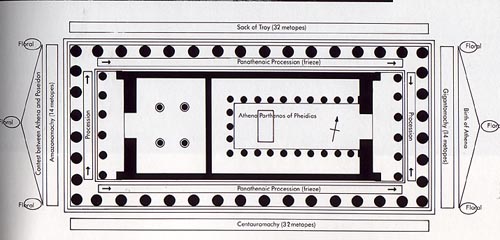Art
web | ARTH Home | ARTH
Courses | ARTH 109 | ARTH 109 Assignments | Forward | Back | Contact
Arth 109
Parthenon
Slide List 9

|
 
|
| View of the Acropolis of Athens. |
Reconstructed views of the Acropolis in
the 5th c. B.C. |
| |

|
| |
Portrait of Pericles |
| |

|
| |
Parthenon, designed by Iktinos and Kallikrates,
c. 447-432 B.C. |

|
|
| "Basilica", Temple of Hera I,
c. 550, Paestom. |
|

|
|
| Plan of the Parthenon. |
|

|
|
| Polykleitos, Doryphoros, c. 450-440 B.C. |
|

|

|
| Reconstruction drawing of the interior
of the Parthenon. |
Marble copy of the cult statue of Athena
by Phidias. 360 degree view of the Varvakion statuette. |

|

|
| Reconstruction of the Athena Parthenos made by Alan LeQuire and housed at the Parthenon replica in Nashville, Tennessee. |
|
| View of the entablature of the exterior
of the Parthenon. |
Metope of the Battle of Lapiths and Centaurs,
c. 447-432 B.C. |
 
|
|
| Metope of the Battle of Lapiths and Centaurs,
c. 447-432 B.C. |
|

|
|
| View of the Ionic Frieze of the Panathenaic
procession. |
|

|
 
|
| Riders in the Panathenaic Procession. |
Riders in the Procession. |

|

|
| Sacrificial animals. |
Men bearing hydras. |

|
|
| Group of Maidens. |
|

|

|
| Group of seated Gods. |
Donation of the peplos to the chief priest. |

|
 
|
| Reconstruction of the West Pediment |
"Three Fates," from the East
Pediment of the Parthenon (Birth of Athena). |
Names and Terms
Pericles (c. 500-429 B.C.)- great Athenian statesman. He dominated
Athens by his persuasive oratory, by his character, and by his
policy. So great was his authority that the period of his power
came to be known as the Age of Pericles. He associated with men
of culture (Protagoras, Phidias, Sophocles, Herodotus). His political
objective was to make Athens an ideal democracy, and establish
its political and cultural supremacy over the other Greek city-states.
Panathenaic procession- a festival in honor of Athena which
was held every year and with special splendor every fourth year.
The festival culminated on the last day in a magnificent procession,
in which the peplos, cloak, was carried to Athena's temple on
the Acropolis, and placed on her statue. The festival seems to
have been of immemorial antiquity. Its foundation is ascribed
to the legendary king Erectheus.
Parthenon: A Gallery of Images
Sculptural Program of the Parthenon

METOPES: Battle of Gods and Giants, Battle of Greeks and Amazons,
Battle of Greeks and Trojans, Battle of Lapiths and Centaurs.
FRIEZE: Panathenaic procession. See Columbia University site.
PEDIMENTS: East: Birth of Athena; WEST: Contest between Athena
and Poseidon over control of Athens.
Quotations
Pericles, Funeral Oration: "Our city is worthy of admiration. We cultivate refinement without extravagance and knowledge without effeminacy."
Sophocles, Antigone:
There are many wonders, but none more wondrous than man....This
resourceful, skillful man. He masters with his inventions the
free-roaming beast of the mountains, and the shaggy-maned horse,
broken for the bit, harnessed about the neck, and the untiring
mountain bull....
Complete Excerpt: 332] Wonders are many, and none is more wonderful than man. [335] This power spans the sea, even when it surges white before the gales of the south-wind, and makes a path under swells that threaten to engulf him. Earth, too, the eldest of the gods, the immortal, the unwearied, [340] he wears away to his own ends, turning the soil with the offspring of horses as the plows weave to and fro year after year. [343] The light-hearted tribe of birds [345] and the clans of wild beasts and the sea-brood of the deep he snares in the meshes of his twisted nets, and he leads them captive, very-skilled man. He masters by his arts [350] the beast who dwells in the wilds and roams the hills. He tames the shaggy-maned horse, putting the yoke upon its neck, and tames the tireless mountain bull. [354] Speech and thought fast as the [355] wind and the moods that give order to a city he has taught himself, and how to flee the arrows of the inhospitable frost under clear skies and the arrows of the storming rain. [360] He has resource for everything. Lacking resource in nothing he strides towards what must come. From Death alone he shall procure no escape, but from baffling diseases he has devised flights. [365] Possessing resourceful skill, a subtlety beyond expectation he moves now to evil, now to good. When he honors the laws of the land and the justice of the gods to which he is bound by oath, [370] his city prospers. But banned from his city is he who, thanks to his rashness, couples with disgrace. Never may he share my home, [375] never think my thoughts, who does these things!
Art
web | ARTH
Home | ARTH Courses | ARTH 109 | ARTH
109 Assignments | Forward | Back
| Contact























